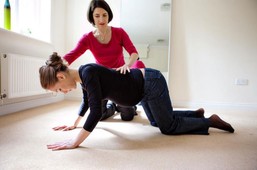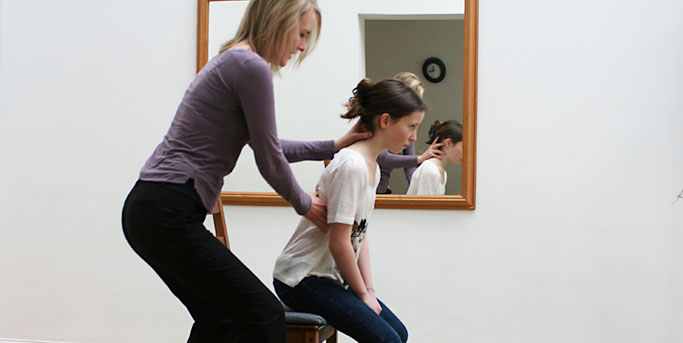 Alexander observed that humans act in the world with their individual habits. Habits are automatic, unconscious responses to stimuli. They are learned through repetitive acts. Habits are necessary because of the often repetitive nature of normal tasks in life. Habits conserve energy and give space for life challenges that are not routine affairs. Habits are goal-oriented. Habits make us feel comfortable with ourselves. We feel powerful. So, they are pleasant, good and necessary. Gradually, scientific research in various areas offer support for F. M. Alexander’s observations, his theoretical groundwork and the practical procedures Alexander developed. That development is crucial in as far as Alexander Technique teachers encourage people not to believe anything but to observe and notice for themselves. Therefore, the Alexander Technique (AT) is placed in the educational as much as in the medical field. People who engage with the Alexander Technique become familiar with the concepts and the practical applications of the work physically, emotionally, psychologically, cognitively and behaviourally. And even though the AT shares characteristics with aspects of the placebo effect, the sum of the complexity of the theoretical and practical approach as well as the physical assumptions and procedures lift the AT into a successful modality. It teaches people how to identify their self-inflicted limitations and accompanies people to learn to be the best Selves they can be. Alexander’s concepts are based on the humanistic discourses of the time and their concepts. The main concept is that of the understanding that humans are born with a unique Self. Alexander did not define the concept of the Self and it is still a controversial concept. As I outlined in my MSc dissertation (Prügel-Bennett, 2015), Alexander, as later J. L. Moreno (father of Psychodrama in the field of psychology), firmly placed the physical self in the concept of the Self. This is still a novelty in the fields of psychology, psychotherapy, So, the Self needs to be understood as an embodied Self. This understanding still contradicts conventional and still prevailing thinking of the mind-body split. Alexander observed that humans act in the world with their individual habits. Habits are automatic, unconscious responses to stimuli. They are learned through repetitive acts. Habits are necessary because of the often repetitive nature of normal tasks in life. Habits conserve energy and give space for life challenges that are not routine affairs. Habits are goal-oriented. Habits make us feel comfortable with ourselves. We feel powerful. So, they are pleasant, good and necessary. At the same time and paradoxically, habits can become a burden and often can stifle human growth. Habits are built on the past and do not allow a person to engage with the present in a new meaningful way. All levels of a person can feel stale. And everyone knows how difficult it is to change a habit. The cycle of cue – routine – reward is so difficult to break (Duhigg, 2012). Often our habits cause reduced functionality. If we still think, act and move in certain ways when we are mature adults as when we were teenagers this will cause problems. Our bodies and environments change, hence we need to change too. Habits stand in contrast to free will. Habits, in the scientific literature are categorised as the lowest degree of human freedom (Kuhl & Qurin, 2011). A successful person in life is signified by an ability of openness of new input. She/he demonstrates appropriate self-regulation (down-regulation) in challenging situations, is able to consider flexibly many options for pursuing a goal and is willing (up-regulating) to actually carry out the steps needed to reach the desired outcome, and to welcome unexpected outcomes and manipulate those. This person demonstrates a high degree of free will. Alexander was a pioneer in actively noticing that the degree of free will of a person can equally be seen in the physical use a person makes of her/his body. He recognised the varying degrees of free will of people and the correlation to their psychological, emotional, physical, behavioural and cognitive health and wellbeing or indeed dysfunctionality. He promoted change. This led him to develop his own theory and procedures that could help people to recover and/or develop individual freedom, high functionality, health and wellbeing. He saw that in order for people to grow they had to learn to inhibit their immediate urge to react to a stimulus. That process is always first of all a mental intervention a person has to make. Instead of running with the first thought that comes to mind which then triggers the domino effect of going into an affect (the reaction to a perception), a physical reaction, in the Alexander Technique we stop mentally and physically – we stay present to ourselves, our cognition and our physical selves. This process is called self-reflexiveness and allows for dysfunctional activity to stop. That means, humans can reflect on what they are thinking and what they are doing to themselves on all levels in the here and now. This intervention is what Alexander called Inhibition. When the moment of inhibition is there, “Directions” (Alexander’s second category for awareness) need to be given to how the goal is going to be pursued. This is a cognitive process, an intervention by the person to allow for a new way to be discovered to go to the goal – with the most important aspect to remain physically free, i.e., refraining from engaging in physical habits, while doing so. Alexander’s innate understanding of the difficulties of relearning, by experience he noticed that this relearning only succeeds with positive awareness, any stress will be counter-productive. Retraining habits requires time and needs to be motivated by the person who wishes to change. Hence, in the Alexander Technique teachers facilitate learning but we cannot do it for anyone. In my experience, people are highly motivated when they experienced something tragic, an accident or when they are ill. Also, Alexander realised that motivation comes more easily or at all when a person is not on her/his own. Hence, engaging with a teacher of the AT or with an introductory group makes it easier to engage with it. Then there is the physical-contact work that is required by hands which can identify a person’s individual habits and help with the intervention. This happens with physical-contact-work. The crux with habits is that we do often not know that we have them. They feel natural – we crave the feeling of them, despite their often detrimental effects. Therefore, until the skill of self-reflexivity is well established, one needs an objective worker alongside, a fully trained Alexander Technique teacher. DIY can only happen afterward the skill of self-reflexivity has been established. This skill is there to stay and connects a person to the whole Self and the world for a lifetime. A higher degree of free will has been learned and established. Alexander Technique teachers do not treat anyone or offer therapy. Alexander placed the responsibility equally in the hands of the client. Alexander Technique teachers undergo a long training (three years full-time) to engage with their own habits and developing their growth with the procedures of the AT. Every AT teacher is required to develop a very high ability for self-reflexivity before they touch anyone else or can qualify as a practitioner. The reason is that without thorough personal work, they cannot detect what is going on in their client and would pass this unconsciously to the client. This would be unethical. The application of the AT has a long tradition in Music and Performing Arts because the results are clearly visible in performances. The exciting news is that lots of Alexander’s procedures and insights can now be supported by work that is done in science. That gives the technique finally the credential it needs to be acceptable on in medicine and education. We can also identify what it is that works in the technique and way. Doris Prugel Bennett References Alexander, F.M. (1998). The Use of the Self, (10th ed.) London: Gollancz. Duhigg, C. (2012). The Power of Habit. London: Random House. Kodish, B.I. (2004). Body Awareness in Theory and Practice. Online Questia: Et Cetera. 61(3). Kuhl. J. & Quirin, M. (2011). Seven Steps Toward Freedom and two Ways to Lose it: Overcoming Limitations of Intentionality Through Self-Confrontational Coping with Stress. Social Psychology. 42(1), 74 – 84. Moreno, J. L. (1985). Psychodrama. First Volume (4th ed). Ambler. PA: Beacon House Inc.
1 Comment
|
The Holistic Life CoachHolistic & Natural Solutions for Health and Wellbeing Categories
All
Archives
March 2018
|
COOKIE POLICYWe use cookies on this site to help us improve your experience. If you wish to understand fully how we use these, click through for our 'cookie policy'.
PRIVACY POLICY |
disclaimerAll material on this website is provided for your information only and may not be construed as medical advice or instruction. |
Contact UsSubscribeJoin our mailing list today!
|



 RSS Feed
RSS Feed